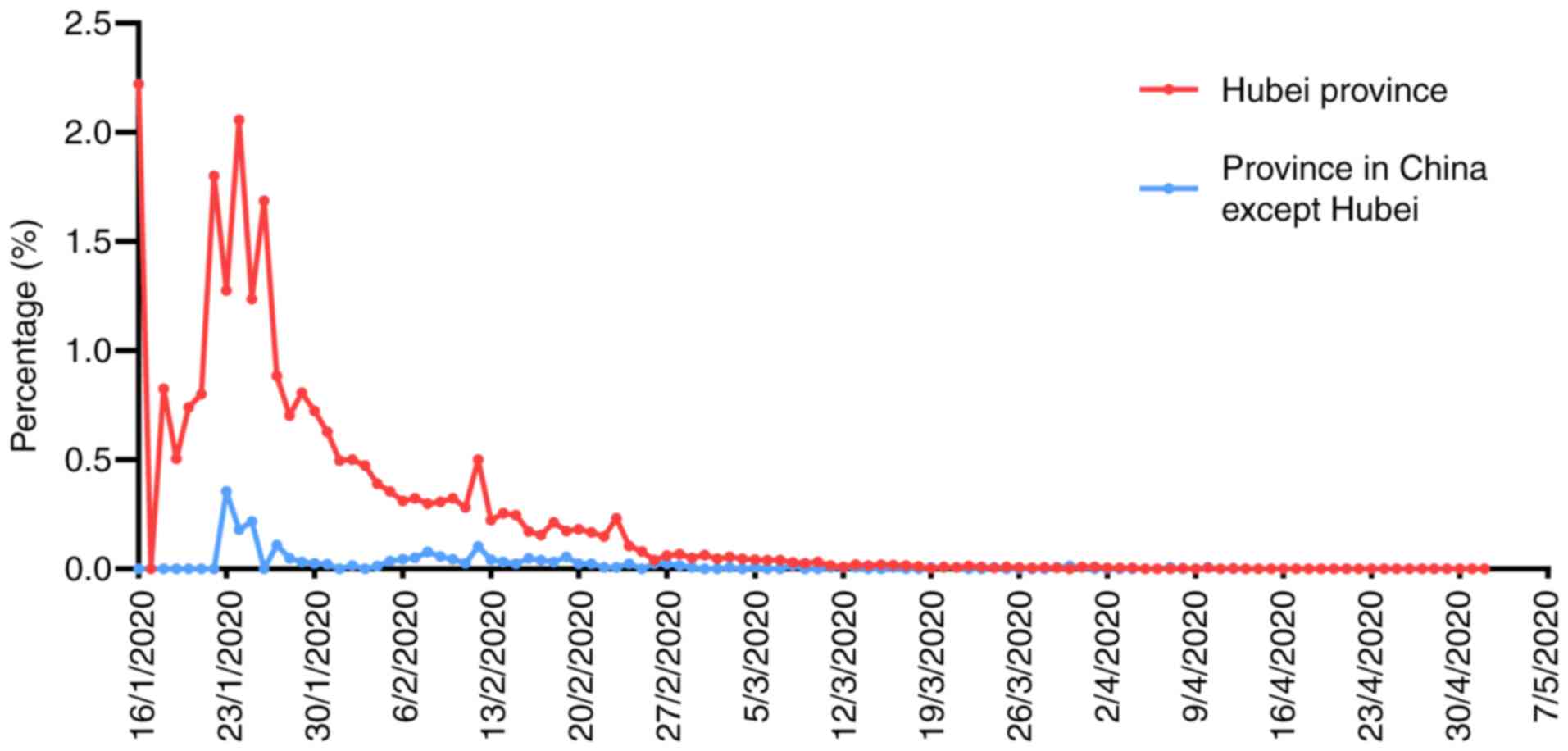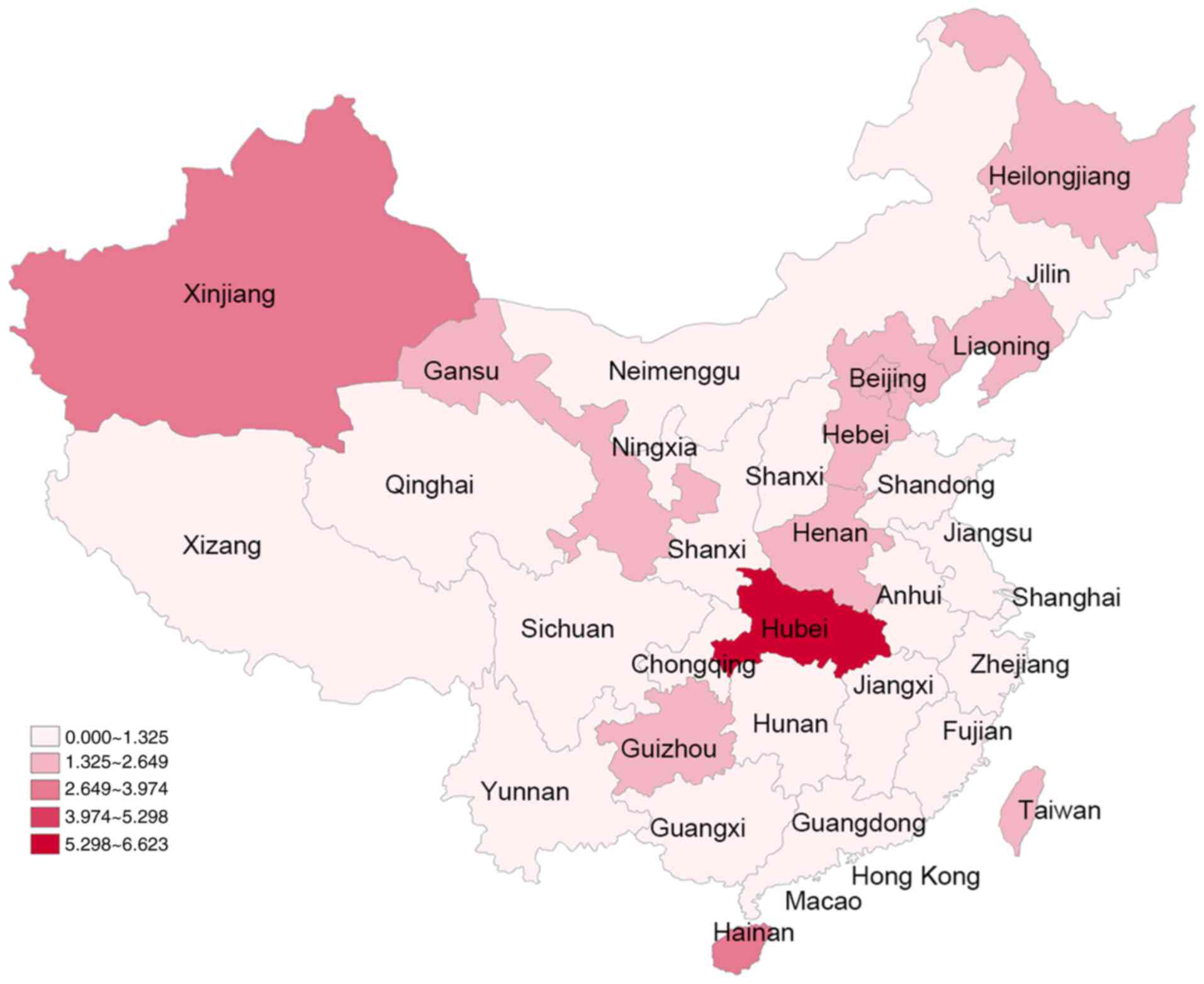|
1
|
World Health Organization. WHO Coronavirus
Disease (COVID-19) Dashboard. urihttps://covid19.who.int/simplehttps://covid19.who.int/.
Accessed Sep 19, 2020.
|
|
2
|
Wu Z and McGoogan JM: Characteristics of
and important lessons from the coronavirus disease 2019 (COVID-19)
outbreak in China: Summary of a report of 72314 cases from the
Chinese center for disease control and prevention. JAMA.
323:1239–1242. 2020.PubMed/NCBI View Article : Google Scholar
|
|
3
|
Xie J, Tong Z, Guan X, Du B, Qiu H and
Slutsky AS: Critical care crisis and some recommendations during
the COVID-19 epidemic in China. Intensive Care Med. 46:837–840.
2020.PubMed/NCBI View Article : Google Scholar
|
|
4
|
Wu C, Chen X, Cai Y, Xia J, Zhou X, Xu S,
Huang H, Zhang L, Zhou X, Du C, et al: Risk factors associated with
acute respiratory distress syndrome and death in patients with
coronavirus disease 2019 pneumonia in Wuhan, China. JAMA Intern
Med. 180:934–943. 2020.PubMed/NCBI View Article : Google Scholar
|
|
5
|
Coronaviridae Study Group of the
International Committee on Taxonomy of Viruses. The species severe
acute respiratory syndrome-related coronavirus: Classifying
2019-nCoV and naming it SARS-CoV-2. Nat Microbiol. 5:536–544.
2020.PubMed/NCBI View Article : Google Scholar
|
|
6
|
Herrmann J, Mori V, Bates JHT and Suki B:
Modeling lung perfusion abnormalities to explain early COVID-19
hypoxemia. Nat Commun. 11(4883)2020.PubMed/NCBI View Article : Google Scholar
|
|
7
|
Pan F, Ye T, Sun P, Gui S, Liang B, Li L,
Zheng D, Wang J, Hesketh RL, Yang L and Zheng C: Time course of
lung changes on chest CT during recovery from 2019 novel
coronavirus (COVID-19) pneumonia. Radiology.
295(200370)2020.PubMed/NCBI View Article : Google Scholar
|
|
8
|
Zou L, Ruan F, Huang M, Liang L, Huang H,
Hong Z, Yu J, Kang M, Song Y, Xia J, et al: SARS-CoV-2 viral load
in upper respiratory specimens of infected patients. N Engl J Med.
382:1177–1179. 2020.PubMed/NCBI View Article : Google Scholar
|
|
9
|
Wang D, Hu B, Hu C, Zhu F, Liu X, Zhang J,
Wang B, Xiang H, Cheng Z, Xiong Y, et al: Clinical characteristics
of 138 hospitalized patients with 2019 novel coronavirus-infected
pneumonia in Wuhan, China. JAMA. 323:1061–1069. 2020.PubMed/NCBI View Article : Google Scholar
|
|
10
|
Dhont S, Derom E, Van Braeckel E, Depuydt
P and Lambrecht BN: The pathophysiology of ‘happy’ hypoxemia in
COVID-19. Respir Res. 21(198)2020.PubMed/NCBI View Article : Google Scholar
|
|
11
|
Shi Y, Wang Y, Shao C, Huang J, Gan J,
Huang X, Bucci E, Piacentini M, Ippolito G and Melino G: COVID-19
infection: The perspectives on immune responses. Cell Death Differ.
27:1451–1454. 2020.PubMed/NCBI View Article : Google Scholar
|
|
12
|
Zhang X, Cai H, Hu J, Lian J, Gu J, Zhang
S, Ye C, Lu Y, Jin C, Yu G, et al: Epidemiological, clinical
characteristics of cases of SARS-CoV-2 infection with abnormal
imaging findings. Int J Infect Dis. 94:81–87. 2020.PubMed/NCBI View Article : Google Scholar
|
|
13
|
Zhou F, Yu T, Du R, Fan G, Liu Y, Liu Z,
Xiang J, Wang Y, Song B, Gu X, et al: Clinical course and risk
factors for mortality of adult inpatients with COVID-19 in Wuhan,
China: A retrospective cohort study. Lancet. 395:1054–1062.
2020.PubMed/NCBI View Article : Google Scholar
|
|
14
|
Huang C, Wang Y, Li X, Ren L, Zhao J, Hu
Y, Zhang L, Fan G, Xu J, Gu X, et al: Clinical features of patients
infected with 2019 novel coronavirus in Wuhan, China. Lancet.
395:497–506. 2020.PubMed/NCBI View Article : Google Scholar
|
|
15
|
Guan WJ, Ni ZY, Hu Y, Liang WH, Ou CQ, He
JX, Liu L, Shan H, Lei CL, Hui DSC, et al: Clinical characteristics
of coronavirus disease 2019 in China. N Engl J Med. 382:1708–1720.
2020.PubMed/NCBI View Article : Google Scholar
|
|
16
|
Han R, Huang L, Jiang H, Dong J, Peng H
and Zhang D: Early clinical and CT manifestations of coronavirus
disease 2019 (COVID-19) pneumonia. AJR Am J Roentgenol.
215:338–343. 2020.PubMed/NCBI View Article : Google Scholar
|
|
17
|
Qian GQ, Yang NB, Ding F, Ma AHY, Wang ZY,
Shen YF, Shi CW, Lian X, Chu JG, Chen L, et al: Epidemiologic and
clinical characteristics of 91 hospitalized patients with COVID-19
in Zhejiang, China: A retrospective, multi-centre case series. QJM.
113:474–481. 2020.PubMed/NCBI View Article : Google Scholar
|
|
18
|
Xu T, Chen C, Zhu Z, Cui M, Chen C, Dai H
and Xue Y: Clinical features and dynamics of viral load in imported
and non-imported patients with COVID-19. Int J Infect Dis.
94:68–71. 2020.PubMed/NCBI View Article : Google Scholar
|
|
19
|
Clark A, Imran J, Madni T and Wolf SE: .
Nutrition and metabolism in burn patients. Burns Trauma.
5(11)2017.PubMed/NCBI View Article : Google Scholar
|
|
20
|
Kreymann G, Grosser S, Buggisch P,
Gottschall C, Matthaei S and Greten H: Oxygen consumption and
resting metabolic rate in sepsis, sepsis syndrome, and septic
shock. Crit Care Med. 21:1012–1029. 1993.PubMed/NCBI View Article : Google Scholar
|
|
21
|
Wiersinga WJ, Rhodes A, Cheng AC, Peacock
SJ and Prescott HC: Pathophysiology, transmission, diagnosis, and
treatment of coronavirus disease 2019 (COVID-19): A review. JAMA.
324:782–793. 2020.PubMed/NCBI View Article : Google Scholar
|
|
22
|
Xu Z, Shi L, Wang Y, Zhang J, Huang L,
Zhang C, Liu S, Zhao P, Liu H, Zhu L, et al: Pathological findings
of COVID-19 associated with acute respiratory distress syndrome.
Lancet Respir Med. 8:420–422. 2020.PubMed/NCBI View Article : Google Scholar
|
|
23
|
Riccetto AG, Ribeiro JD, Silva MT, Almeida
RS, Arns CW and Baracat EC: Respiratory syncytial virus (RSV) in
infants hospitalized for acute lower respiratory tract disease:
Incidence and associated risks. Braz J Infect Dis. 10:357–361.
2006.PubMed/NCBI View Article : Google Scholar
|
|
24
|
Rousseau-Blass F and Pang DS:
Hypoventilation following oxygen administration associated with
alfaxalone-dexmedetomidine-midazolam anesthesia in New Zealand
White rabbits. Vet Anaesth Analg. 47:637–646. 2020.PubMed/NCBI View Article : Google Scholar
|
|
25
|
Singer M: Critical illness and flat
batteries. Crit Care. 21 (Suppl 3)(S309)2017.PubMed/NCBI View Article : Google Scholar
|
|
26
|
Shi L, Lu ZA, Que JY, Huang XL, Liu L, Ran
MS, Gong YM, Yuan K, Yan W, Sun YK, et al: Prevalence of and risk
factors associated with mental health symptoms among the general
population in China during the coronavirus disease 2019 pandemic.
JAMA Network Open. 3(e2014053)2020.PubMed/NCBI View Article : Google Scholar
|
|
27
|
Schmid W, Rosland JH, von Hofacker S,
Hunskår I and Bruvik F: Patient's and health care provider's
perspectives on music therapy in palliative care-an integrative
review. BMC Palliat Care. 17(32)2018.PubMed/NCBI View Article : Google Scholar
|
|
28
|
Koelsch S and Jäncke L: Music and the
heart. Eur Heart J. 36:3043–3049. 2015.PubMed/NCBI View Article : Google Scholar
|
















